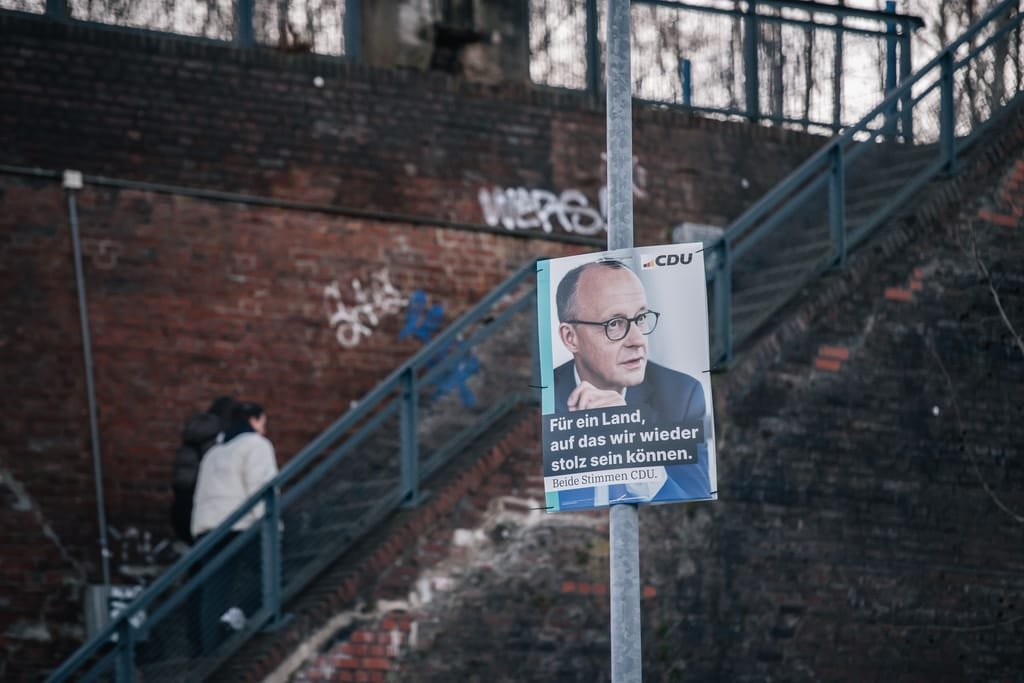Friedrich Merz and his conservatives view Angela Merkel’s legacy as a liability in their battle with the far right.

BERLIN ― Friedrich Merz, the candidate leading the race to become Germany’s next chancellor, is all but running against his conservative predecessor: Angela Merkel.
At a campaign rally in the northern Germany city of Flensburg, Merz presented himself as the antithesis of Merkel, a fellow Christian Democrat and a four-term chancellor, particularly on the issue of migration.
“We can’t do this!” Merz told the crowd earlier this week, playing on Merkel’s famous 2015 mantra — “We can do this!” — during an unprecedented refugee influx that year. At the time, Merkel’s pronouncement symbolized Germany’s proverbial “welcome culture,” which manifested in its willingness to take in several hundred thousand asylum seekers.
Merz’s motive in distancing himself so firmly from Merkel’s legacy is clear. Ahead of a national election set for Feb. 23, Merz’s center-right Christian Democratic Union (CDU) is in a fierce fight to keep more conservatives from defecting to the far-right Alternative for Germany (AfD) party — and views Merkel’s legacy as a liability.
The AfD is now polling in second place on 21 percent after a rise in support in recent weeks, but is still well behind Merz’s first-place conservatives, who are at 30 percent.
During the campaign the AfD has hammered home a consistent message: Merz and Merkel are cut from the same cloth. At the AfD’s convention earlier this month, for instance, Alice Weidel, the party’s chancellor candidate, dedicated much of her speech to equating Merz with Merkel and depicting the CDU as essentially a leftist party that has let migration and crime run amok in Germany.
“We know the CDU, dear Ms. Merkel, and we know you too, dear Mr. Merz,” Weidel said. She then urged Germans to opt for the AfD, or as she put it: “Vote for the original.”
Merz has pulled the CDU much farther to the right since taking over the leadership of the party in 2022, not only on migration but also on energy and the economy. While Merz has long opposed Merkel’s more centrist approach, however, until now he has rarely drawn such a stark contrast with her as he did in Flensburg.
During his speech, Merz argued that Germany is taking in far more migrants than it can possibly integrate. The country, he said, could not take in millions of asylum seekers and provide schools, healthcare and housing for them, “no matter how hard we try.”
“I promise you this,” he added. “Under my leadership, the numbers will drastically go down, because we are serious about limiting illegal migration to Germany.”
Merz’s conservatives — like all other German parliamentary parties — have ruled out a coalition with the AfD after the election, maintaining a firewall around the far-right party. Given that stance, the conservatives’ likeliest coalition partners are the center-left Greens and the Social Democratic Party.
The AfD has tried use the firewall for its own gain, attacking the CDU for preferring to govern with leftist parties.
“The CDU has unconditionally surrendered to a leftist-Green ideology,” Weidel said during her convention speech, calling the CDU a “party of betrayal.”
Merz is in a more difficult spot politically, attempting to double down on his tough-on-migration message while at the same time distancing his party from the AfD — a delicate task as he tries to peel away that party’s supporters.
“We don’t think the same as them,” he said of the AfD in Flensburg. “It’s not the Alternative for Germany. It’s the demise of Germany.”




